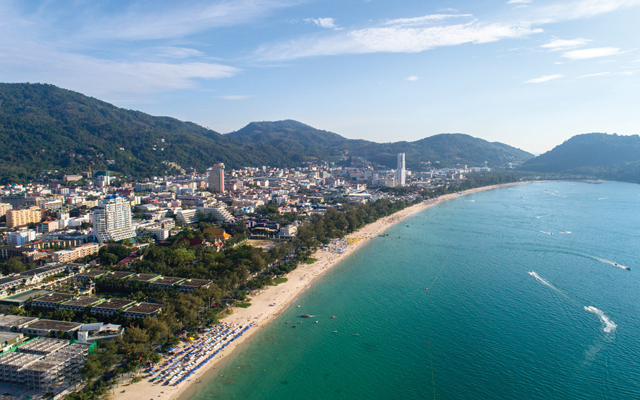Coastal delights
31 Oct 2018
Phuket has largely built its stature as a beach holiday island, but it is increasingly transforming into an urbanised holiday destination, shaped by the forces of growing airlift, surging visitor numbers and changing source markets.
“A definite shift in geographic markets over the past 10 years”, with China, Russia and Australia making up bigger market shares than before, has led to “rising demand for non-beach centric activities”, according to a recent report by C9 Hotelworks.

Michael Ayling, general manager of Blue Tree Phuket – a US$40 million water park and lagoon destination opening in early 2019 – thinks the attractions sector is still underserved in Phuket, as the island has comparatively fewer water parks than Pattaya and Hua Hin.
Besides Blue Tree Phuket, other upcoming themed tourism attractions include Vana Nava Water Park, Entertainment Park, and Aquaria at the new Central Festival mall extension.
The arrival of more theme parks will enable Phuket to have a stronger year-round appeal, said Ayling, as the focus of tourist activities can turn inland during the monsoon months from May to October.
At the same time, the arrival of Middle Eastern airlines bringing more direct air connections to Phuket is already turning the island into a year-round destination, attracting not just the regional market but European visitors too.
Matthew Hindmarch, director of hotels and resorts, Aksara Collection, noted: “The Scandinavians are coming year-round now thanks to growing air connectivity. A traditional high season market like Denmark is starting to travel year-round.”
Following the recent expansion of the Phuket International Airport, the Airports of Thailand has announced a US$1.8 billion second airport in Phang Nga, just over the Sarasin Bridge. C9 expects Phuket’s improving infrastructure to create a broader Greater Phuket Tourism Triangle that includes Phang Nga to add diversity and refresh Phuket’s maturing global appeal.
However, industry players warn of room oversupply in Phuket, which is already showing strains of overdevelopment, especially in Patong Beach.
“It’s getting difficult to sell Phuket,” said Richard Brouwer, CEO of Khiri Travel, as the deluge of hotel development and visitors have made Phuket into “a prime beach destination for the volume market”.
David Kevan, partner and product person of UK-based Chic Locations, agreed: “Phuket doesn’t need any more hotels – it has enough.”
According to C9, Phuket has a total of 1,774 tourist accommodation establishments with 84,427 keys as of 1Q2018, including registered and unregistered properties.
Meanwhile, the popular holiday island sees no sign of abatement in its still-expanding hotel supply, including a Mandarin Oriental coming in 2022. – Xinyi Liang-Pholsena
CEBU: overtourism risk with growing popularity
More hotels and resorts will dot Cebu’s Mactan Island over the next several years, with investors and visitors lured by the destination’s growing popularity and better accessibility.
Already boasting the biggest cluster of upmarket hotels and resorts including a Shangri-La, Movenpick, Plantation Bay and Maribago, Cebu will soon welcome the 271-key Dusit Thani Mactan Cebu in 4Q2018, the 250-key Sheraton Mactan Resort in 2019, plus upmarket local hospitality brands like Aruga, Grafix, Ayala Land’s Seagrove in the pipeline.
Mactan, already known as a luxury beach destination, will undoubtedly draw more tourists with the July opening of Mactan-Cebu International Airport’s (MCIA) resort-themed Terminal 2.
With better airport infrastructure and an array of properties that other destinations lack, Cebu is now the top alternative destination in lieu of Boracay, which was closed for a six-month rehabilitation since April 26.
Indeed, Margie Munsayac, vice president – sales and marketing, Bluewater Resorts, confirmed that rooms in Mactan are difficult to secure at the moment in Mactan as it benefits from Boracay’s closure.
Mactan attracts mainly Asians, specifically North Asians, for stays of three to four nights.
Jid Velasco, director of sales and marketing, Plantation Bay Resort and Spa in Mactan, shared that the there’s almost no distinction between the high and low seasons for the property due to the steady stream of guests year-round.
But with hotel and resort developments centred in Mactan’s Puerto Engano area, the destination’s “carrying capacity is becoming a real concern for the industry”, said Jojo Clemente, president of Tourism Congress of the Philippines (TCP), who also urged a study to address the possibility of overcapacity and overdevelopment in Mactan.
Clemente, who became an advocate for establishing the carrying capacity of tourist destinations in the Philippines following Boracay’s closure, opined that Mactan can still accommodate “a few more resorts” to maintain its current arrivals but certainly “not too much” to avoid strains on the island’s resources. – Rosa Ocampo
LANGKAWI: unseco status a natural asset
For Langkawi, the UNESCO Global Geopark status is a valuable marketing asset the destination heavily relies on, attracting visitors drawn by its offerings of pristine beaches, mangrove swamps and billion-year-old limestone formations.
Iskandar Zulkarnain, director of sales and marketing at The Andaman, A Luxury Collection Resort, Langkawi, shared that the UNESCO Global Geopark status is what differentiates Langkawi from Bali’s culture and Phuket’s nightlife.
He said: “The tagline, Naturally Langkawi, complements the UNESCO Global Geopark status and attracts nature lovers and holidaymakers looking for ecotourism attractions.”
But connectivity remains a key challenge for this Malaysian beach destination, with international links limited to Singapore, and Guangzhou, Kunming and Guiyang in China.
Langkawi Development Authority (LADA) CEO, Azizan Noordin, is currently looking into improving the destination’s air accessibility by lobbying for more international airlines – namely Qatar Airways, Emirates, Finnair, Thai Airways and Hainan Airlines – to launch direct flights to Langkawi.
LADA is also in talks with Germany’s Condor Air, which will commence services between Frankfurt and Kuala Lumpur from November.
To encourage airlines to test new routes to Langkawi, LADA is providing chartered flights with incentives.










